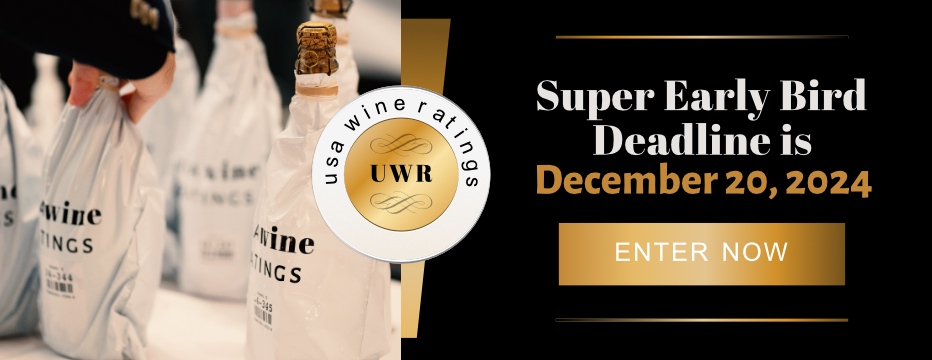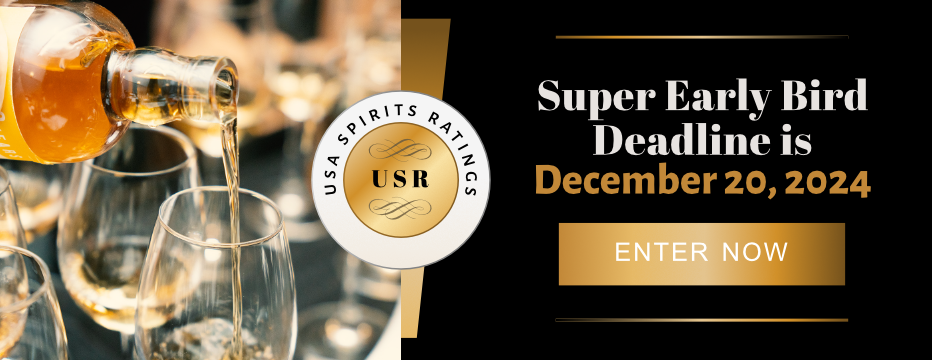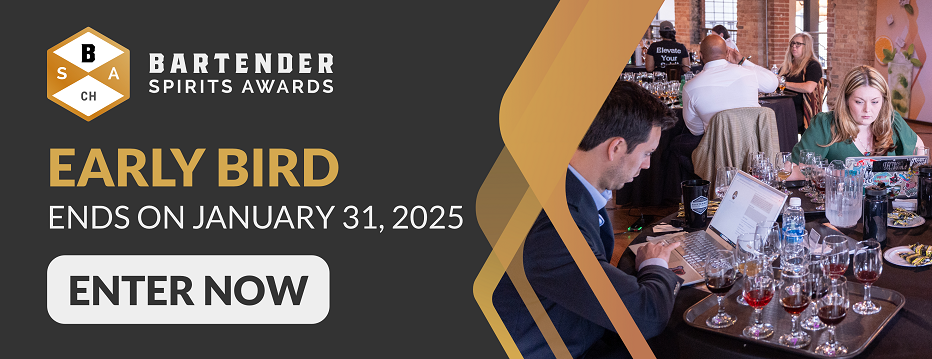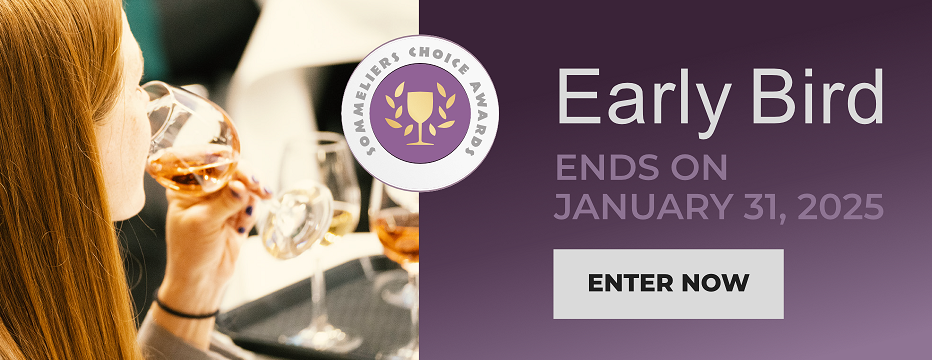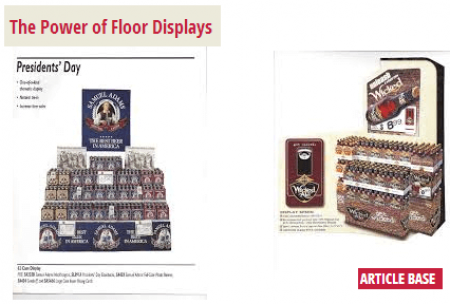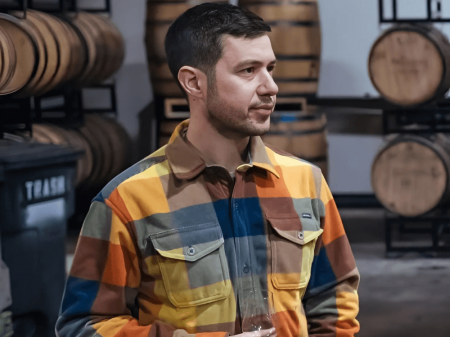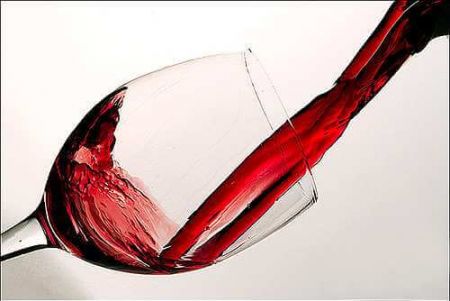Sommeliers Choice Awards 2024 Winners
Guiding Spain's Wine Industry to Global Excellence: Insights from Susana García Dolla
Insights into the evolution of Spain's wine industry under Susana García Dolla's leadership

As the world’s third-largest wine producer, Spain holds a prominent position in the global wine industry. At the helm of this dynamic sector is Susana García Dolla, General Director of the Interprofessional Wine Organization of Spain (OIVE), who is spearheading efforts to enhance the global presence of Spanish wines. García Dolla’s strategic approach emphasizes innovation, sustainability, and a deep respect for Spain’s rich winemaking traditions. In this conversation, she provides a glimpse into her vision for the future of Spanish wine and the initiatives driving growth and excellence."
The 2024-2029 standard extension contains data on consumption and promotional activities. Could you elaborate on some of the strategies OIVE uses to market Spanish wine nationally and internationally?
Since 2017, we have worked to promote Spain’s wine. It is one of our priority lines of action, to which we allocate almost 80% of our budget.
Regarding promotion in the domestic market, we carry out advertising campaigns in conventional and digital media (https://mejorconvino.com/) and promote BTL actions targeting consumers (https://espaciovino.es/). In addition, given the wide range of products, we offer training for both professionals and consumers (https://escuelavino.es/ ). All the activities aim to rejuvenate the category and attract new consumers.
In terms of international promotion, we have several active programs to promote Spanish wine in markets such as China and Mexico. We also have a joint promotion program underway together with ViniPortugal aimed at tourists visiting both countries, so that they can get to know our wines and their culture.
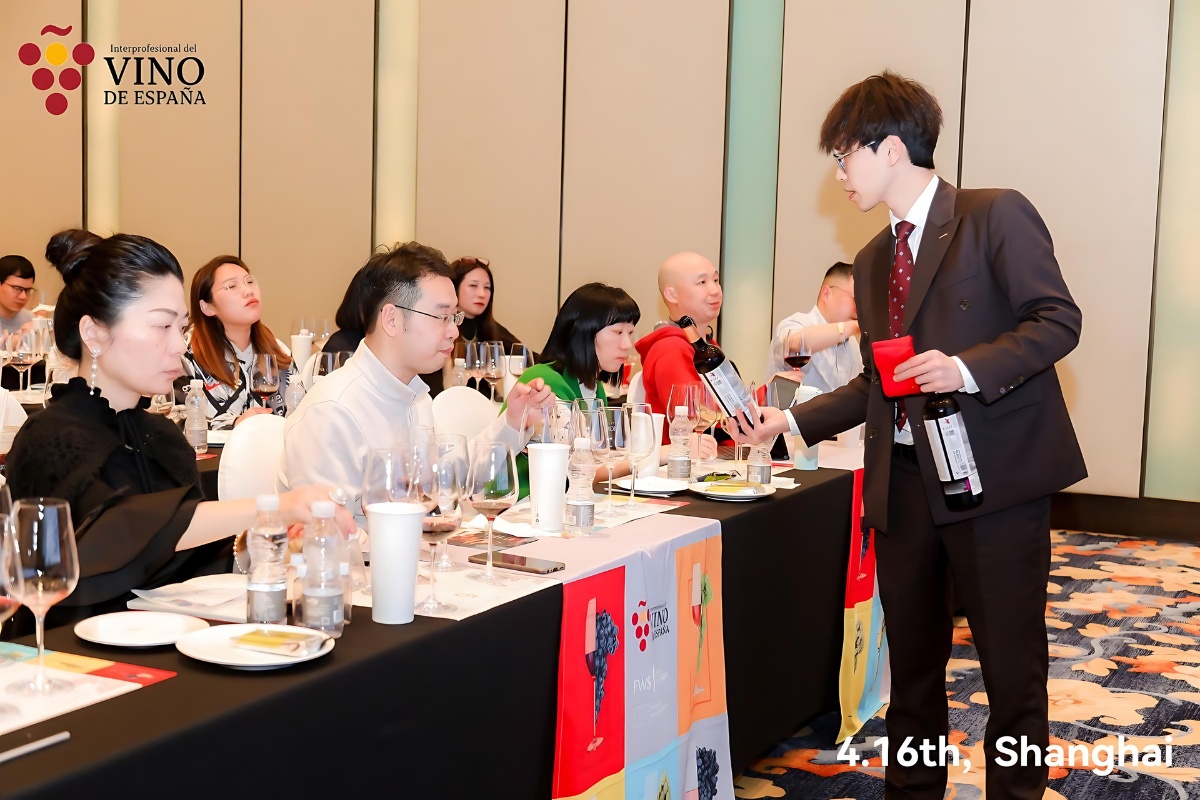
Image: "Masterclass of Top Spanish Wines" given by Julien Boulard and organized by the Organización Interprofesional del Vino de España (OIVE) in China.
In Spain, we have a rich and wide offer of wine, with some unique and distinctive and many well-known native grape varieties. We have almost 150 recognized geographical designations and protected geographical indications that demonstrate the uniqueness and quality of our wines. It is a rich heritage that we want to show to the world.
Given the uncertainties of international trade, such as tariffs and political tensions, how is OIVE working to secure and expand market access for Spanish wines worldwide?
Spain is a leading country in terms of wine production with a relatively small domestic market. Therefore exports and access to markets become crucial issues and questions such as market uncertainty, political tensions or protectionist drifts threaten our balance and that of the thousands of people and families who work in the wine industry in Spain. It must be taken into account that wine activity accounts for almost 2% of GDP and more than 2% of employment in our country.
At OIVE, we consider that it is unacceptable that our sector is a bargaining chip for international commercial conflicts. This is what we have stated repeatedly to the different administrations, both national and European. We meet regularly with other European organizations, address these issues, and study ways of collaboration and joint action on issues of common interest.
As OIVE, our objective is to improve the image and enhance the knowledge of Spanish wines in markets of interest, and our actions are aimed at promoting the marketing of our products and demanding the support of the administrations for the opening of new markets.
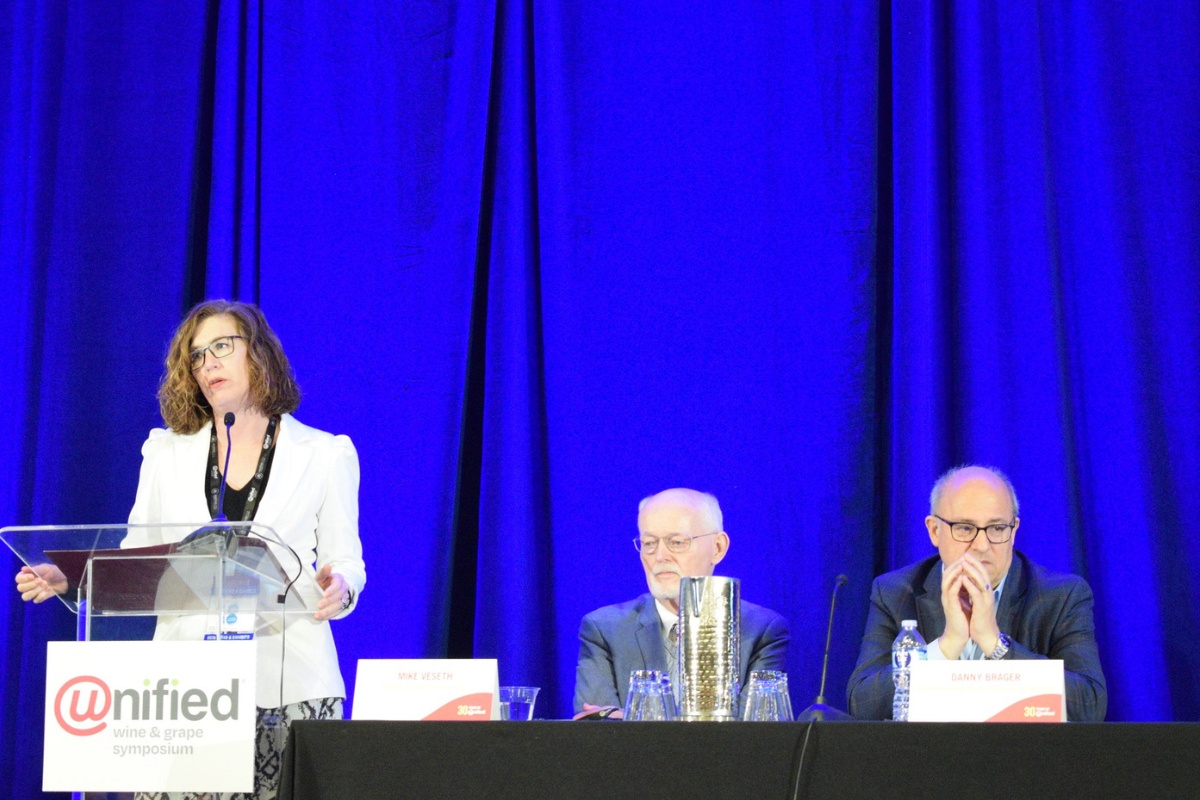
Image: Susana García, spoke at the central “State of the Industry” conference to highlight the sector and its strategic plan. This year, the symposium brought together 12,000 professionals from around the world for three days of conferences.
As a prominent female leader in the wine industry, what are your thoughts on the representation and advancement of women within this sector? What initiatives, if any, has OIVE undertaken to support gender diversity?
Women have always been very important in the Spanish wine sector. At OIVE we work to make this role more visible. To this end, we promote reports that highlight the importance of women in the whole wine value chain and how, little by little, they are managing to reach the top levels.
For instance, between 2009 and 2020, the number of female heads of vineyards has doubled and 30.4% of the vineyards are owned by women. Likewise, around 30% of the workers in Spanish wineries are women. This rate of female participation is higher than that of the industrial sector as a whole in Spain, which is close to 27%.
Women are also very present in positions linked to technical and quality management, as well as in administration, communication, and marketing areas.
In what ways does OIVE apply sector and economic intelligence to guide its strategy and decision-making? Can you tell us more about a recent data-driven decision that has significantly impacted the sector?
Economic and scientific intelligence, its application, and its transfer to the wine value chain are essential for the prosperity of a sector such as ours, subject to multiple changing variables and forced to face very complex challenges: from the climatology that affects our production to consumer habits and market trends. We work in the dissemination of rigorous and timely information on the evolution of markets at the national and international levels as a useful tool for wineries’ decision-making. Also, I would like to highlight we heavily bet on innovation through the dissemination of R&D results to the sector. These apply from the vines to the markets for the improvement of our performance at all levels. This commitment to innovation is implemented through training courses, both face-to-face and online, which are being very well welcomed.
We are very focused on promoting R&D. It is a topic that especially affects our sector, such as environmental sustainability. In collaboration with the Plataforma Tecnologica del Vino (www.ptvino.com), we promote projects to boost mitigation and adaptation to the climate change effects on the wine sector.
As a milestone, I would mention our strategic plan for Spain’s wine sector is a tangible result of putting all the market intelligence and sector expertise together.
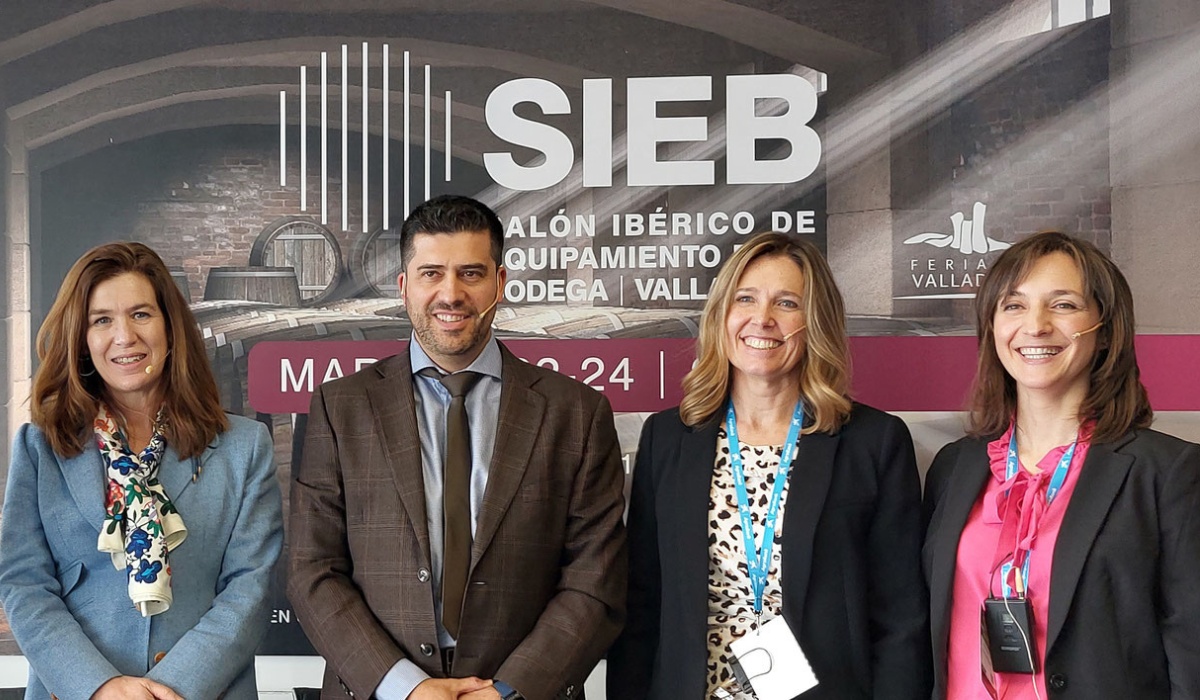
Image: The director of the OIVE, Susana García (On the Left Side), and the director of PTV, Mario de la Fuente (Second from the Left Side), presented the Strategic Agenda for Innovation in the Wine Sector 2021-2024 within the framework of Agrovid/SIEB, the Fair for the cultivation of Vines.
What are some of the current regulatory challenges that the Spanish wine sector is experiencing, and how is OIVE addressing these to ensure the continued growth and sustainability of the industry?
One of the biggest challenges facing the sector is the health policies that advocate zero alcohol consumption at a global level. They do not focus on combating abusive consumption through education and prevention policies, but rather on prohibitions and limitations that penalize millions of adults who consume wine in moderation, together with their meals, enjoying and tasting a product that is part of the gastronomic culture, especially in the Mediterranean area.
The international wine sector, and our organization, defend and promote moderate wine consumption, scientifically proven as compatible with a healthy lifestyle. This is especially true in combination with the Mediterranean diet and lifestyle. Of course, this moderate consumption does not apply to underage, or when driving or pregnant.
The 2022-2027 strategy aims to recover value share in both national and international markets. What are the key components of this strategy, and how do you measure its success?
The Strategy for the Spanish Wine Sector 2022-2027 is all about the future, taking advantage of our heritage built in the past, to boost the sector towards a horizon full of success for the whole wine value chain.
Our main objective is to improve the image and increase the value of Spanish wines in the markets and to equitably distribute that value throughout the chain to ensure the sustainability of the sector. To this end, we are working on 101 actions grouped into 10 strategic pillars, and to monitor the implementation, we have created a committee made up of experts from our member organizations. This group monitors the actions and the achievement of the objectives set out in our roadmap to success. The strategic pillars range from working in sustainability, wine tourism, and healthy lifestyles, to issues such as intelligence, R&D, and digitalization of the sector.
Research, Development, and Innovation (R&D&I) are crucial for the future of wine. What specific R&D&I initiatives is OIVE currently supporting, and how do these programs intend to benefit the sector?
As mentioned before, we believe that the future of the sector depends on the firm commitment to R&D and innovation. For this reason, we have agreements with different organizations to promote research work, especially concerning mitigation and adaptation to the effects of climate change on our productions, and in the transfer and application of measures.
For the development of actions in this area, we have a collaboration agreement with the key player for these issues in Spain (PTV). Within the framework of the agreement, since 2018, a total of 64 projects linked to Sustainability and Climate Change have been successfully dynamized. They represent a total budget of almost 80 million euros, obtaining a total of just over 60 million in public funding.
Regarding the design, dynamization, and execution of our annual technical training plan, a total of 20 training actions have been carried out since 2018 with more than 2000 attendees.
In addition, this line of action includes the promotion of research projects on wine and health. In 2022, for the first time, in collaboration with the Foundation for Wine and Nutrition Research (FIVIN. www.fivin.com, www.lacienciadelvino.com ), research grants were announced for “Wine, Nutrition and Health”, with an amount of 80,000 euros. We have planned the launch of the second edition in the coming weeks.
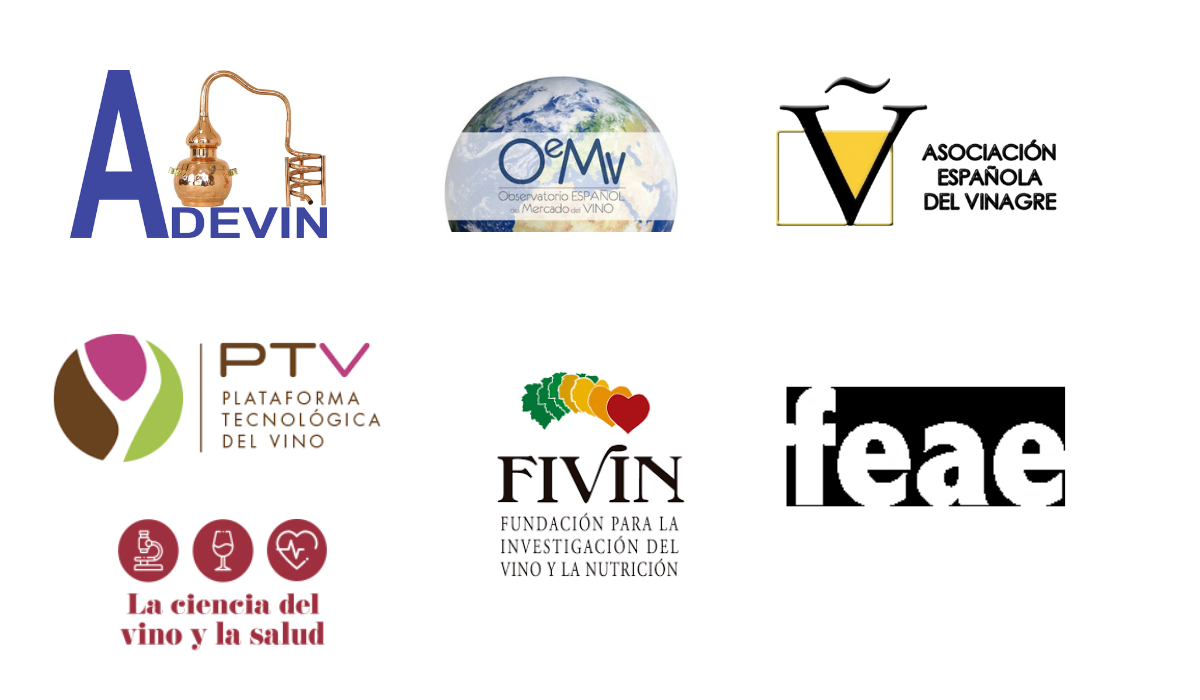
Image: As established in the statutes, the Advisory Committee includes organizations from the wine sector that are not members of OIVE, but are part of the “great family” of vine and wine products, such as musts, vinegars, and wine distillates.
There is an increasing interest in the link between wine and health. How does OIVE balance encouraging responsible consumption while also addressing health concerns associated with wine consumption?
We defend the legitimacy of wine as an inherent part of the millenary Mediterranean diet. We are aware that we must work with scientific and health authorities to avoid abusive alcohol consumption and prevent the damage it causes to people’s health and society. To this end, we actively promote that wine can only be consumed in moderation. This is the only way to enjoy the product. And, of course, we always refer to moderate consumption by healthy adults that must be avoided at times when it is incompatible such as pregnancy or if you are going to drive or operate machinery. We promote responsible communication and advertising with very strict rules. For instance, it is banned to link alcohol consumption with success (professional, sexual, ...) and we rely on recommendations backed by science for those who want to enjoy the product. To this end, Interprofessional del Vino de España is a participant in the international Wine in Moderation program and has an agreement with the Fundación para la Investigación del Vino y la Nutrición (FIVIN) for research on the issue and dissemination of results.
We are active, therefore, in struggling against the disorderly consumption of alcohol and defending the wine sector from disproportionate regulations that penalize consumers and producers of a millenarian sector, a pillar of our economy, culture, gastronomy, and history.
With the changing dynamics of consumer preferences, how is OIVE adapting its marketing and promotional efforts to engage younger and more diverse audiences?
Our goal is to bring wine culture closer to the consumer, putting together moderation, enjoyment, and gastronomy. To this end, we have worked on campaigns that promote moderate consumption without any complexes. We campaign for the idea that you don’t have to be an expert to enjoy wine. On the other hand, our promotion is also based on experiential marketing. In our case, we have taken these experiences of learning to enjoy wine to big cities in Spain such as Madrid, Barcelona, or Malaga with innovative proposals.
Another message we want to convey is that there is wine from Spain for every palate and occasion, taking advantage of the wide range of wine styles to suit the tastes of all consumers.
In addition, we are very focused on communicating to society everything that lies behind each bottle of wine, which is an ambassador of the name and quality of Spanish wines, and also of the work and tradition of a sector that creates jobs, fixes the population and is socially, environmentally and economically sustainable.
And let’s not forget about wine tourism. It is also a good way to get to know what is behind a glass of wine and we want to take advantage of Spain’s attractiveness as a tourist destination so that visitors get to know the rich wine offer we have to offer.
What CSR (Corporate Social Responsibility) initiatives does OIVE prioritize, and how do they align with the broader goals of the Spanish wine sector?
In addition to all the activities carried out around the Wine in Moderation program, the Spanish wine sector has gone further. More and more wineries are working on triple sustainability (economic, social, and environmental) and are measured through independent certifiers. In our case, the Sustainable Wineries for Climate Protection (SWfCP) certification is a seal of approval for the Spanish sector, promoted by the Spanish Wine Federation, which we at OIVE recognize as a further step to demonstrate our commitment to sustainability and our objectives, as a sector, to achieve sustainable production and more efficient use of natural resources. All this work is positioning the Spanish wine sector as a leader in sustainability.
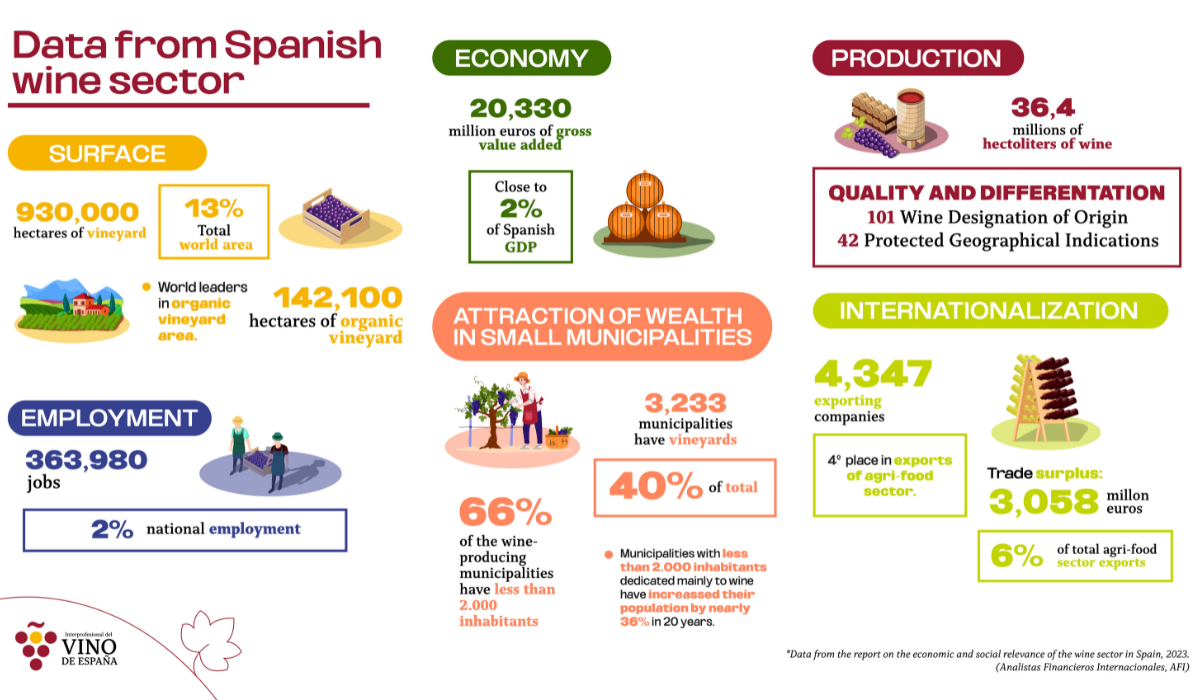
OIVE is collaborating with ViniPortugal on a European program to promote wine. Can you share more details about this collaboration and its expected impact on the Spanish wine sector?
We are two countries with a long winemaking tradition, with many territorial and historical ties, and we share a lifestyle based on wine culture. In addition, we are leaders in international tourism, so in 2021 we decided to work together on a program financed with European funds, based on showing tourists the quality and diversity of the wine offer, especially around our quality labels and native grape varieties. To this end, we have developed advertising campaigns in airports and train stations in the two countries and European press trips to tour our wine regions. With this joint program, the two interbranch organizations seek to reinforce the image of wine as a product of excellence and to raise the competitiveness of the wine sector and its tradition in Europe.
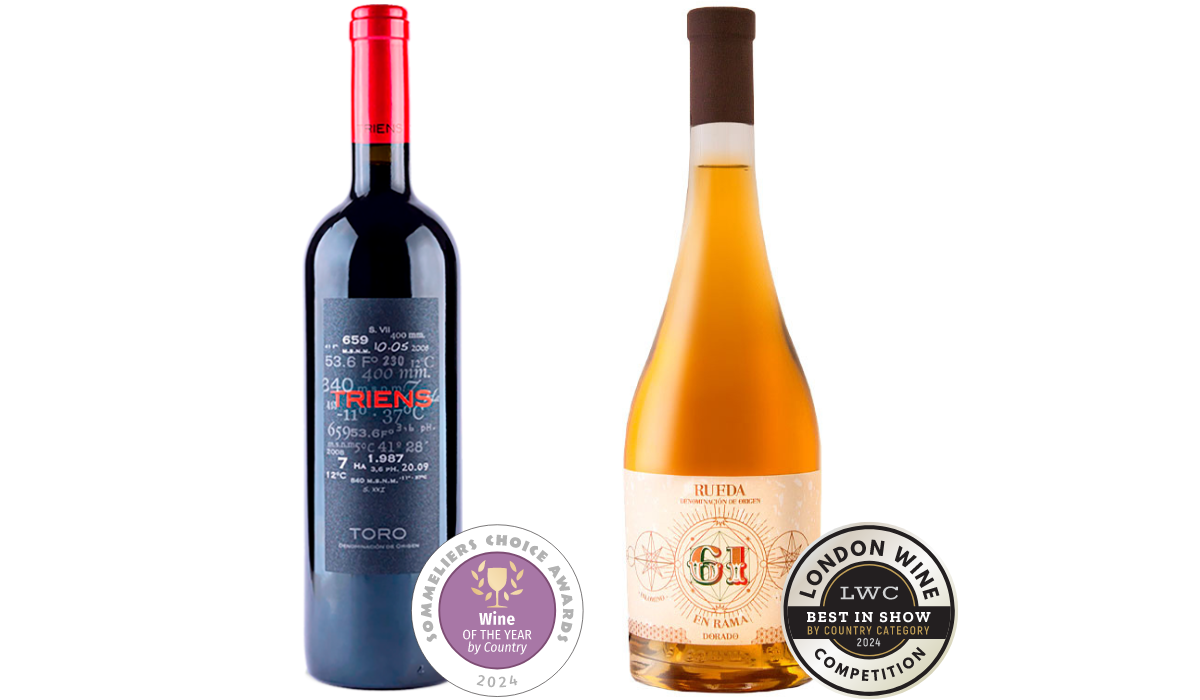
Image: (L-R) 2024 Sommelier Choice Awards Winner: Triens, 95 Points - Wine Of The Year By Country and 2024 London Wine Competition Winner: 61 Dorado En Rama, 94 Points - Best In Show By Country.
Conclusion:
As Susana García Dolla continues to lead Spain’s wine industry through innovation and strategic growth, the future looks promising for Spanish wines on the global stage. With a strong emphasis on sustainability, market diversification, and a deep respect for tradition, García Dolla is helping to secure a bright future for Spain’s wine sector. Her leadership ensures that Spanish wine remains a powerful force in the global market, and her vision promises continued success in the years to come.
In conversation with Malvika Patel, Editor and VP, Beverage Trade Network

